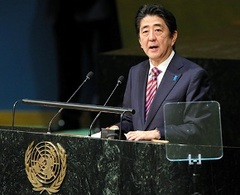 www.ajw.asahi.com
www.ajw.asahi.com The speech itself was well received, with commentary noting Japan’s long-held ambition to be admitted into the UNSC as part of the G4 (Brazil, Germany, India, and Japan). Yet it was what was said after the speech during a press conference that garnered the most interest from both Japan’s domestic media and some of the global news organisations covering the event. During the conference, when asked whether Japan would admit some of the hundreds of thousands of Syrian and Iraqi refugees into Japan under its humanitarian program, PM Abe stated that Japan had to first deal with its own domestic agenda before it could contemplate accepting refugees, adding “As an issue of demography, I would say that before accepting immigrants or refugees, we need to have more activities by women, by elderly people and we must raise (the) birthrate. There are many things that we should do before accepting immigrants”, before also adding that Japan’s financial contributions would help in the push to alleviate the conditions that caused the exodus in the first place.
News organisations in Japan, which supportive of the sentiment towards assisting refugees, were left somewhat perplexed by Abe’s comments. While Japan has certainly been extraordinarily generous in its aid program, the low number of refugees taken in by Japan has been the source of debate both within Japan and in wider global organisations , and Abe’s comments won’t have alleviated some of the concerns that perhaps Japan needs to adopt a more open policy towards accepting refugees.
The other matter that I wanted to touch upon concerns comments from Ambassador Sumio Kusaka here in Australia on Japan’s bid for the Future Submarine Contract. In an exclusive interview given two weeks ago, Ambassador Kusaka laid out in detail Japan’s commitment to having each and every one of Australia’s future submarines built in Australia should the Turnbull government wish it so. This commentary, not surprisingly, was warmly greeted by the government, with Industry Minister Christopher Pyne stating that it was “music to my ears”.
Ambassador Kusaka’s commentary was an expansion on comments made in late August in Adelaide, in which Japanese submarine builders had said that they would be prepared to build in Australia as one of three options Japan was exploring (precisely the same conditions laid down by the DOD that both DCNS and TKMS have been operating under). That message should resonate loudly and clearly, and is in keeping with what I have been saying about the potential for an Australia-Japanese submarine collaboration for the past two years – that it should be a shared project, with Japanese manufacturing practices taught to Australians in order for domestic skills to be upgraded and put to use building submarines here.
This issue is certainly going to be one dominating the dialogue between Australia and Japan for the next few months, and one that this blog may touch upon from time to time. These are exciting days folks, and things have only just begun!
 RSS Feed
RSS Feed